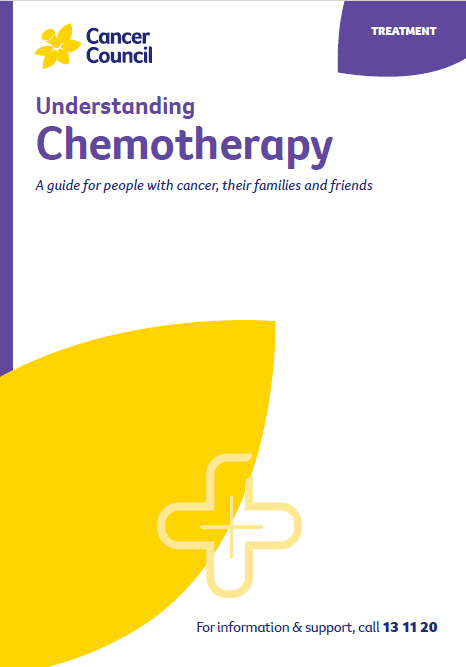- Home
- Stomach cancer
- Treatment
- Chemotherapy
Chemotherapy for stomach cancer
Chemotherapy uses drugs to kill or slow the growth of cancer cells.
Learn more about:
When chemotherapy is used
For stomach cancer, chemotherapy is used:
- before surgery (neoadjuvant chemotherapy) – to shrink large tumours and destroy any cancer cells that may have spread
- after surgery (adjuvant chemotherapy) – to reduce the chance of the cancer coming back
- as palliative treatment – to help control the cancer and improve quality of life; this can sometimes prolong survival.
How it is given
Chemotherapy drugs are usually given as a liquid through a drip inserted into a vein (intravenous infusion). It may also be given through a tube that is implanted and stays in your vein throughout treatment. This is called a central venous access device (CVAD) and there are different types (e.g. a port-a-cath). Sometimes, chemotherapy is given as tablets you swallow. You will usually receive treatment as an outpatient (when you visit hospital for treatment but are not admitted).
Most people have a combination of chemotherapy drugs over several treatment sessions, with rest periods of 2–3 weeks in between. Together, the session and rest period are called a cycle. Your doctor will talk to you about how long your treatment will last.
For more on this, see our general section on Chemotherapy.
Side effects of chemotherapy
The side effects of chemotherapy vary greatly for each person. Some people have few side effects, while others have many. Most side effects are temporary, but some may last longer or be ongoing. Your medical oncologist or nurse will discuss the likely side effects with you, including how they can be prevented or controlled with medicine.
Side effects may include:
- feeling sick (nausea)
- vomiting
- appetite changes and difficulty swallowing
- sore mouth or mouth ulcers
- skin and nail changes
- numbness in the hands or feet
- ringing in the ears or hearing loss
- constipation or diarrhoea
- hair loss or thinning
- being more likely to catch infections.
If you feel unwell or have a temperature of 38°C or higher, seek urgent medical attention.
I found it really beneficial to participate in a clinical trial looking at what combination of treatment worked best for stomach cancer. The treatment path I trialled was preoperative chemotherapy, a total gastrectomy, and postoperative chemotherapy.”
Pete
→ READ MORE: Targeted therapy for stomach cancer
Video: What is chemotherapy?
Watch this short video to learn more about chemotherapy.
Podcast: Making Treatment Decisions
Listen to more episodes from our podcast for people affected by cancer
More resources
Prof David I Watson, Matthew Flinders Distinguished Professor of Surgery, Flinders University, and Senior Consultant Surgeon, Oesophago-Gastric Surgery Unit, Flinders Medical Centre, SA; Prof Bryan Burmeister, Senior Radiation Oncologist, GenesisCare Fraser Coast and Hervey Bay Hospital, QLD; Kieran Cahill, Consumer; Jessica Jong, Clinical Dietitian, Upper GI and Hepatobiliary Services, Peter MacCallum Cancer Centre, VIC; John Leung, Consumer; Prof Rajvinder Singh, Professor of Medicine, University of Adelaide, and Director, Gastroenterology Department and Head of Endoscopy, Lyell McEwin Hospital, SA; Dr Sarah Sutherland, Medical Oncologist, Chris O’Brien Lifehouse, NSW; Paula Swannock, Upper GI Cancer Nurse Consultant, St Vincent’s Hospital Melbourne, VIC; Rebecca Yeoh, 13 11 20 Consultant, Cancer Council Queensland.
View the Cancer Council NSW editorial policy.
View all publications or call 13 11 20 for free printed copies.

